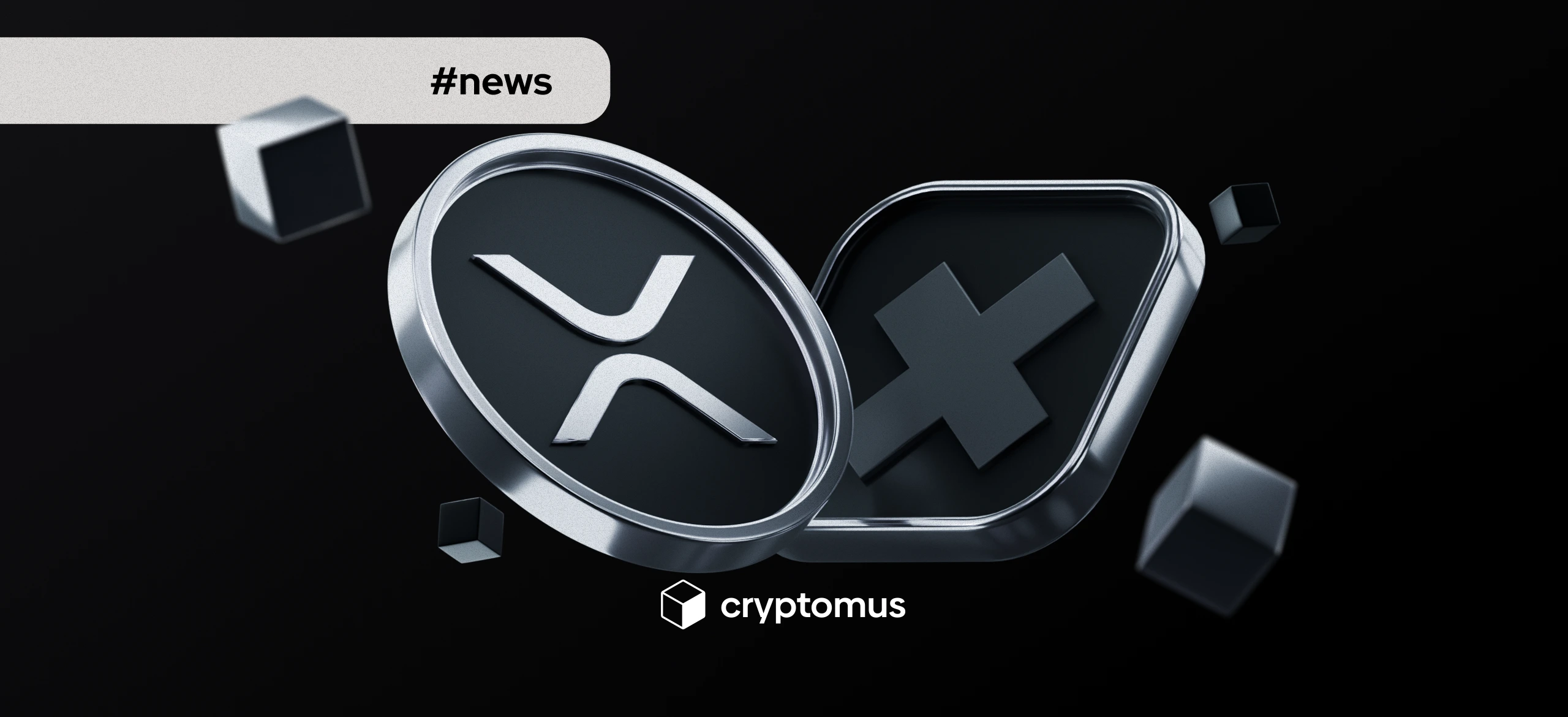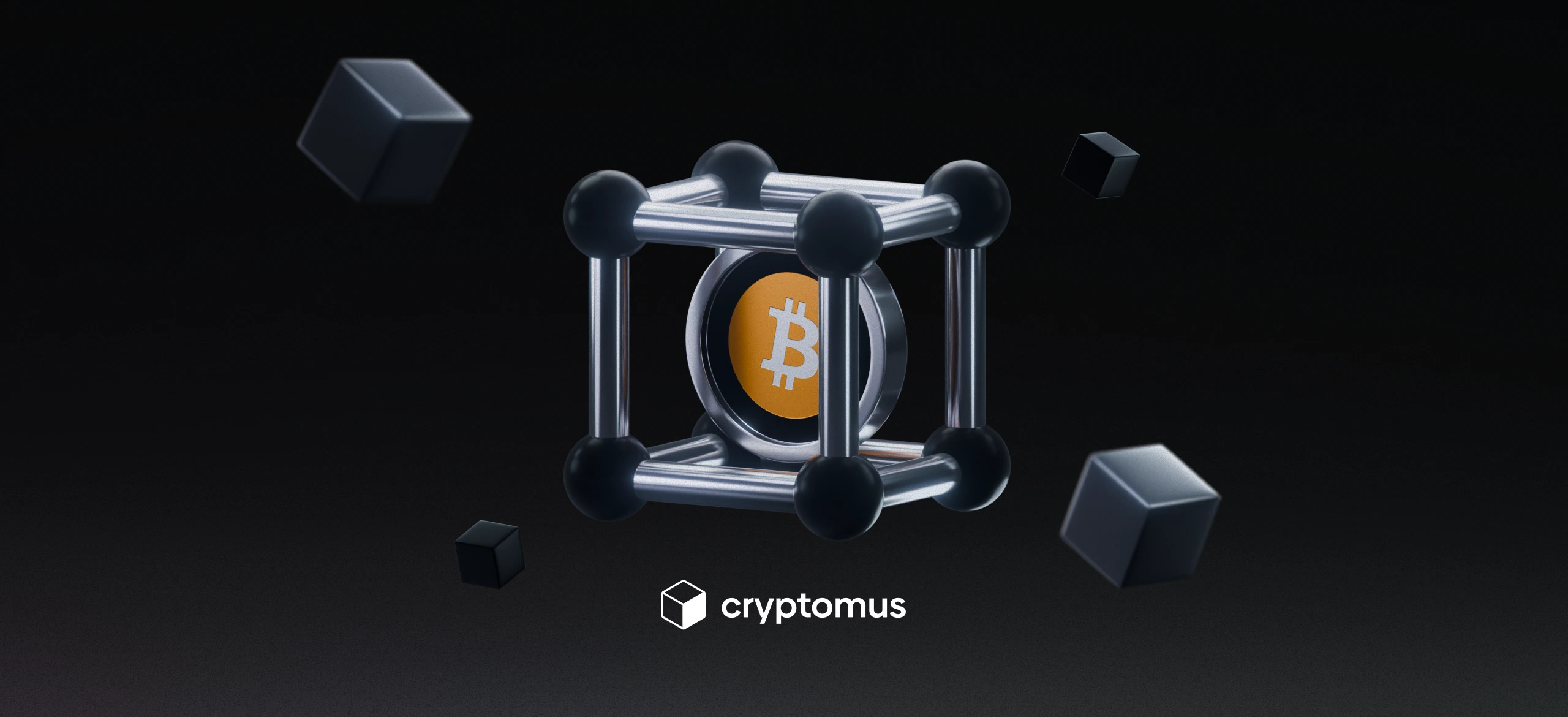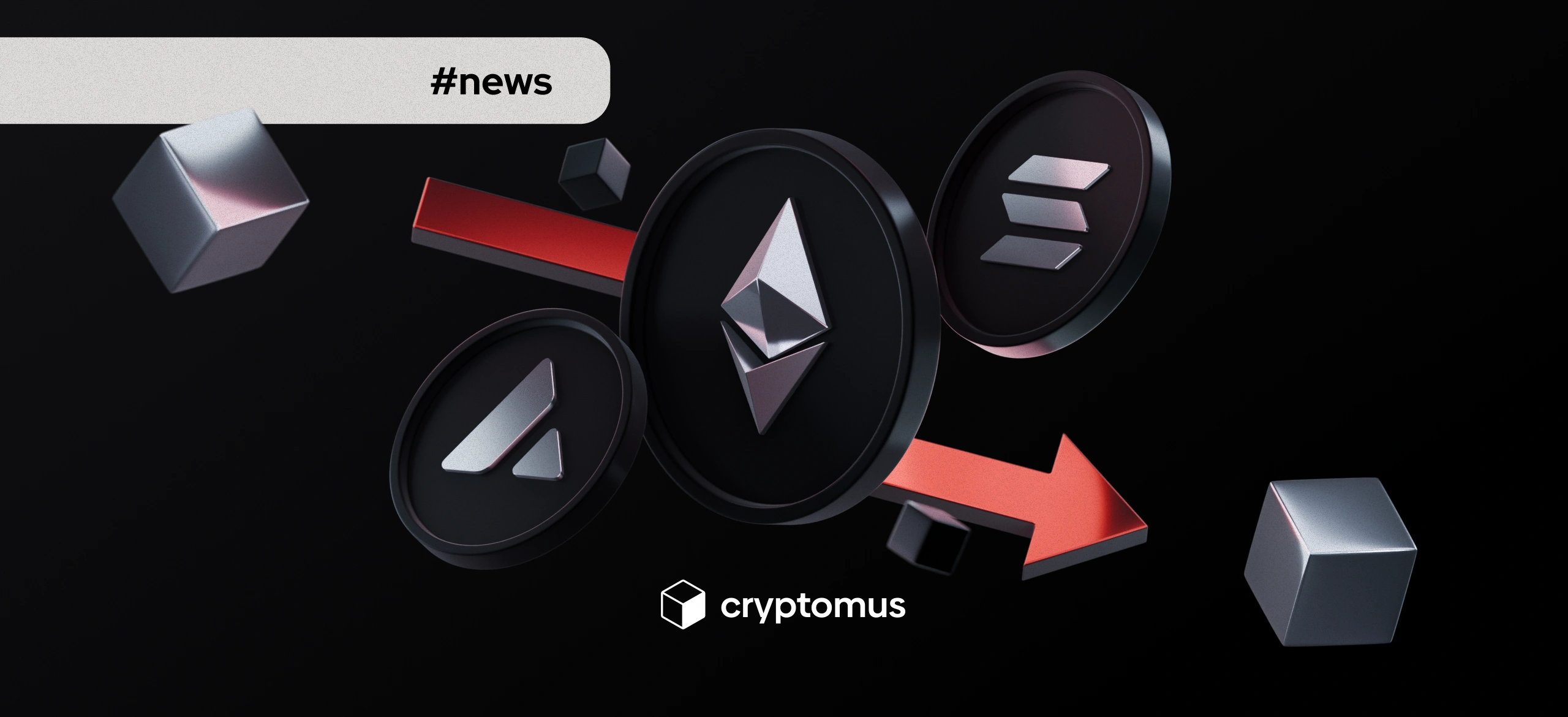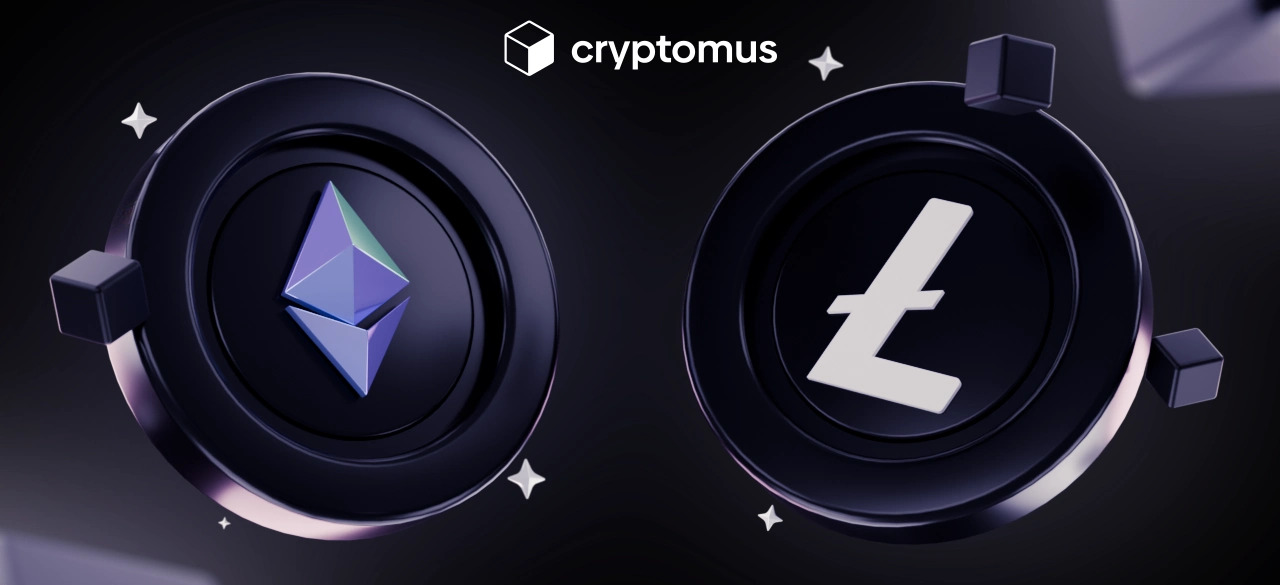
Ethereum Vs. Litecoin: การเปรียบเทียบแบบสมบูรณ์
สารบัญ
มีคริปโทเคอร์เรนซีจำนวนหนึ่งที่ถูกพัฒนาเป็นทางเลือกของเหรียญแรกอย่าง Bitcoin ในบรรดาเหรียญเหล่านี้ ได้แก่ Ethereum และ Litecoin ซึ่งกลายเป็นตัวเลือกที่น่าสนใจสำหรับนักลงทุน แต่เหรียญไหนดีกว่ากัน? ในบทความนี้ เราจะพาเจาะลึกคำถามนี้และอธิบายถึงความแตกต่างหลักระหว่าง Ethereum และ Litecoin
Ethereum (ETH) คืออะไร?
Ethereum คือ blockchain ที่ถูกออกแบบมาเพื่อให้การปรับขยายและเพิ่มประสิทธิภาพของการทำธุรกรรมดีขึ้น มันทำงานบน smart contracts ที่ช่วยให้กระบวนการต่าง ๆ เป็นอัตโนมัติจากเงื่อนไขการดำเนินการที่ถูกบันทึกไว้
อีกฟังก์ชันที่สำคัญของ ecosystem ของ Ethereum คือการรองรับแอปพลิเคชันแบบกระจายศูนย์ (dApps) เนื่องจากมีจำนวนมากภายใน blockchain ทำให้ Ethereum ถูกใช้งานอย่างกว้างขวางทั้งใน DeFi และ NFT สิ่งนี้ดึงดูดผู้ใช้จำนวนมาก และนำไปสู่การลงทุนในเหรียญ ETH ของเครือข่ายด้วย แน่นอนว่าการสนับสนุนแบบนี้ทำให้เครือข่ายมีความปลอดภัยสูง ซึ่งถือเป็นหนึ่งในปัจจัยที่สำคัญที่สุดในการเลือกเครือข่ายเพื่อใช้งาน
Litecoin (LTC) คืออะไร?
Litecoin คือเครือข่าย blockchain ที่ถูกสร้างขึ้นมาเพื่อการทำธุรกรรมแบบ peer-to-peer เหรียญ LTC เป็นหนึ่งในเหรียญแรก ๆ ที่เกิดขึ้นหลังจาก Bitcoin ซึ่งเป็นเหตุผลที่บางครั้งมันถูกเรียกว่า “เงินดิจิทัล (digital silver)” เมื่อเทียบกับ “ทองดิจิทัล (digital gold)” อย่าง BTC
เครือข่าย Litecoin ใช้ code base เดียวกันกับ Bitcoin แต่ก็มีองค์ประกอบอื่นที่ช่วยปรับปรุงจุดอ่อนของมัน
ธุรกรรมบนเครือข่าย Litecoin มีความเร็วที่สูงกว่าและค่าธรรมเนียมที่ต่ำกว่า จึงเป็นที่ต้องการในหมู่เทรดเดอร์ ยิ่งไปกว่านั้น LTC ยังมีความผันผวนต่ำ ทำให้เป็นตัวเลือกที่ดีสำหรับผู้ที่ต้องการลงทุนระยะยาว ด้วยข้อดีเหล่านี้ Litecoin จึงไม่ด้อยกว่าเหรียญคริปโทเคอร์เรนซีจำนวนมากในแง่ของปริมาณการซื้อขาย
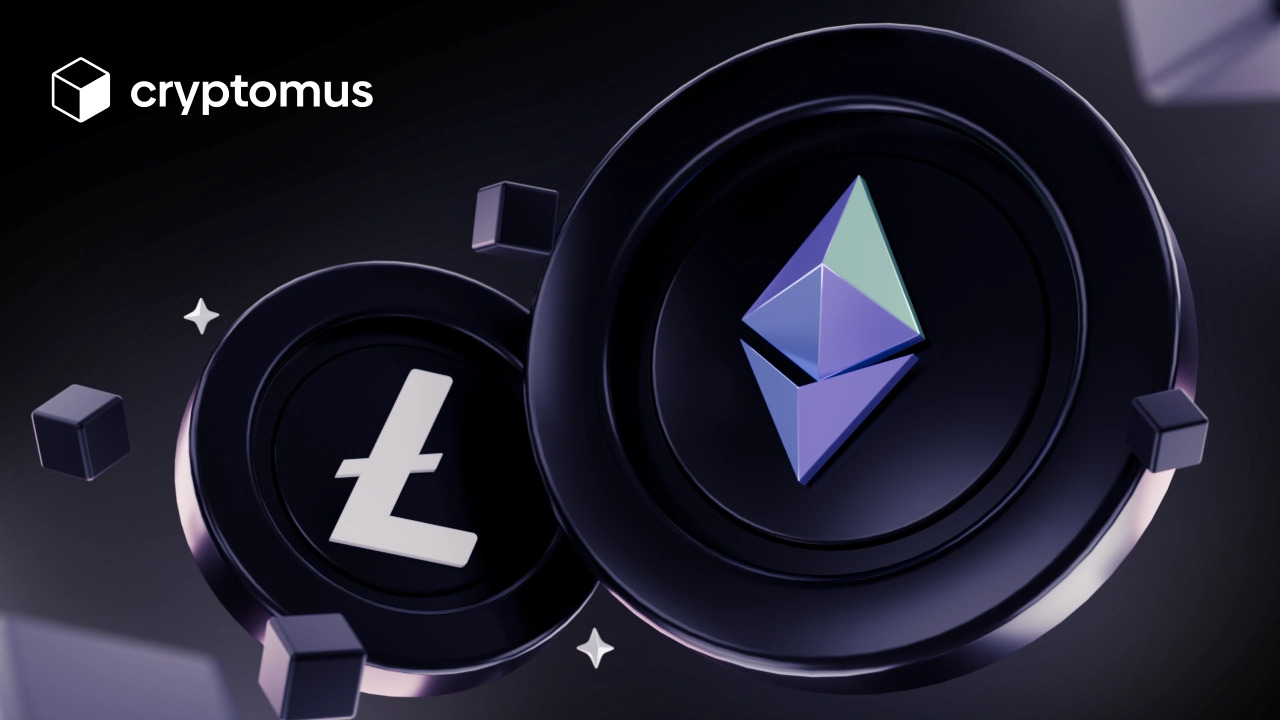
Ethereum Vs. Litecoin: ความแตกต่างหลัก
ดังที่ได้กล่าวไปแล้ว Ethereum และ Litecoin ต่างก็เป็นเวอร์ชันที่พัฒนาต่อยอดจาก Bitcoin สิ่งนี้เห็นได้จากฟังก์ชันและคุณสมบัติของเครือข่าย มาดูกันอย่างละเอียดว่าความแตกต่างหลักระหว่างสอง ecosystem นี้คืออะไร
วัตถุประสงค์
Ethereum ปรากฏขึ้นในปี 2015 และถูกสร้างมาเป็น blockchain ที่สามารถเขียนโปรแกรมได้ โดยจัดเก็บมูลค่าในรูปแบบโทเค็น ETH บทบาทของโทเค็นมุ่งเน้นไปที่การรัน smart contracts และการชำระค่าธรรมเนียมธุรกรรมที่ซับซ้อนหากสำเร็จ ในขณะที่ Litecoin ถูกพัฒนาขึ้นในปี 2011 เป็นโทเค็นสำหรับการทำธุรกรรมในชีวิตประจำวัน ซึ่งมีเงื่อนไขราคาเหมาะสมและสะดวกต่อการใช้งาน
Consensus Mechanism
blockchain ทั้งสองนี้ใช้กลไกที่ต่างกัน Ethereum เริ่มต้นด้วย Proof-of-Work (PoW) ที่ให้ miners สร้าง block ใหม่ แต่กลไกนี้จำกัดความสามารถในการปรับขยายของเครือข่าย ทำให้ต่อมา Ethereum เปลี่ยนไปใช้ Proof-of-Stake (PoS) ซึ่งช่วยให้ธุรกรรมเร็วขึ้นและมีประสิทธิภาพมากขึ้น ขณะที่ Litecoin ยังคงใช้กลไก PoW เหมือน BTC
ความเร็วของธุรกรรม
Ethereum สามารถประมวลผลได้ 20–30 ธุรกรรมต่อวินาที (TPS) โดยมี block time 13 วินาที อย่างไรก็ตาม ผู้เชี่ยวชาญเชื่อว่าการเปลี่ยนไปใช้กลไก PoS จะช่วยเพิ่ม TPS ของ Ethereum ได้ถึงหลักพันในอนาคต ส่วน Litecoin สามารถประมวลผลได้ประมาณ 56 TPS แต่มี block time ที่ช้ากว่า Ethereum โดยใช้เวลา 2 นาที 20 วินาที ทั้งนี้ เวลาที่ใช้จริงอาจแตกต่างกันไปขึ้นอยู่กับความแออัดของเครือข่าย
ค่าธรรมเนียม
ค่าธรรมเนียมธุรกรรมในเครือข่ายก็สามารถแตกต่างกันไปขึ้นอยู่กับความแออัด Ethereum จะมี gas fee โดยเฉลี่ยที่ 2 gwei หรือประมาณ 0.17 ดอลลาร์สหรัฐ ขณะที่ Litecoin มีค่าธรรมเนียมที่ถูกกว่า โดยอยู่ระหว่าง 0.01–0.1 ดอลลาร์สหรัฐ
Ethereum Vs. Litecoin: การเปรียบเทียบแบบตัวต่อตัว
ตอนนี้คุณก็รู้ความแตกต่างหลักระหว่างเครือข่าย Ethereum และ Litecoin แล้ว เราขอแนะนำให้คุณทบทวนข้อมูลเหล่านี้อีกครั้ง รวมถึงสำรวจรายละเอียดอื่น ๆ ที่อาจมีประโยชน์ในกระบวนการลงทุน
| Crypto | Coin issue | Mechanizm | Goal | Price | Speed | Scalability | |
|---|---|---|---|---|---|---|---|
| Ethereum (ETH) | Coin issueไม่มีการจำกัดจำนวนเหรียญสูงสุด | MechanizmProof-of-Stake (PoS) | Goalแพลตฟอร์มที่เชื่อถือได้สำหรับ dApps พร้อมความปลอดภัยสูง | Priceประมาณ 2,650 USD | Speed13 วินาทีต่อการยืนยัน | Scalability20–30 TPS | |
| Litecoin (LTC) | Coin issue84 ล้านเหรียญ | MechanizmProof-of-Work (PoW) | Goalแพลตฟอร์มที่สะดวกสำหรับธุรกรรมประจำวัน | Priceประมาณ 60 USD | Speed2 นาที 20 วินาที (140 วินาที) ต่อการยืนยัน | Scalability56 TPS |
Ethereum Vs. Litecoin: ควรซื้อเหรียญไหนดี?
Ethereum และ Litecoin ต่างก็มีมุมมองที่ดีสำหรับ การลงทุน แต่ก็มีความแตกต่างอย่างมีนัยสำคัญในบางประเด็นที่ส่งผลต่อการตัดสินใจ ตัวอย่างเช่น Ethereum เป็นโปรเจกต์ที่มีขนาดใหญ่กว่า Litecoin เพราะมีศักยภาพในการลงทุนมากกว่า และสามารถรัน dApps หลากหลาย นอกจากนี้ยังมีการคาดการณ์ว่าความสามารถในการปรับขยายของเครือข่ายจะเพิ่มขึ้นเมื่อเวลาผ่านไป ซึ่งช่วยเพิ่มประสิทธิภาพของธุรกรรม
ในขณะเดียวกัน Litecoin ก็ดูเป็นการลงทุนที่ดีกว่า Ethereum เพราะถูกสร้างขึ้นมาเพื่อเก็บรักษามูลค่าตั้งแต่แรก ยิ่งไปกว่านั้น เหรียญ LTC ยังสะดวกต่อการใช้ทำธุรกรรมในชีวิตประจำวัน และเมื่อโลกกำลังก้าวไปสู่การใช้สกุลเงินดิจิทัลมากขึ้น ตัวเลือกนี้ก็ยิ่งมีโอกาสประสบความสำเร็จสูง
ทั้ง Ethereum และ Litecoin ต่างก็มีโอกาสเติบโตที่ดีและเป็นตัวเลือกการลงทุนที่น่าสนใจ การเลือกลงทุนเหรียญใดควรขึ้นอยู่กับความสำคัญและความชอบส่วนตัวของคุณ เราหวังว่าบทความนี้จะเป็นประโยชน์ และหากคุณยังมีคำถามหรืออยากแบ่งปันความคิดเห็น โปรดแสดงความคิดเห็นไว้ด้านล่าง!
ทำให้การเดินทางสู่ Crypto ของคุณง่ายขึ้น
อยากเก็บ ส่ง รับ เดิมพัน หรือซื้อขายคริปโทเคอร์เรนซีใช่ไหม? Cryptomus ทำได้ทุกอย่าง — สมัครและจัดการกองทุนคริปโทเคอร์เรนซีของคุณด้วยเครื่องมืออันแสนสะดวกของเรา
เริ่มต้นใช้งาน

